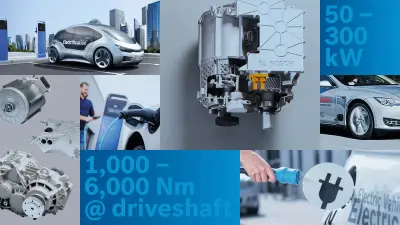Boundless collaboration
Creating a new shopping experience in three steps

A start-up mindset, experience with big companies, and customer expertise spell success in the e-commerce segment. In three steps, a Sino-German project team, based in Stuttgart and Shanghai, got a digital Bosch department store for China off the ground.
Step #1: create new working cultures

You won’t find any folders or paper files; everything is written on magnetic whiteboards. Marketing experts and programmers regularly find themselves working in new teams and in new corners of the office. It’s agility in practice, with extremely short project throughput times that often last only three weeks. For the marketing and sales project team at Bosch, located in Stuttgart and Shanghai, this is the only way to work. It’s a new form of collaboration that is driven by the transformation that is fundamentally reshaping B2C business. The Bosch flagship store on Tmall, the leading Chinese e-commerce platform for brands and retailers, is another example along the same lines. It’s a new way for Bosch to reach consumers directly – alongside its traditional wholesale and retail activities. Moreover, the range of products it offers transcends divisional and product categories.
“It’s a supplementary channel, not a competing one,” says the digital marketing manager Nadine Kanja about the new approach. That’s how the strategist Sun-Mi Choi in Shanghai sees it too: “Our internal structures and tried-and-true business models have to adapt to and help shape our customers’ rapidly changing worlds of shopping and consumption. Bosch has the flexibility to do that. People who aren’t digital natives need to be shown the advantages of this form of interaction. Both worlds can learn from each other. Connectivity means not only linking the physical and virtual worlds, but also bringing people together.”

“In China, you have to build up a relationship with your customers. That goes for online too. It’s a process that calls for finesse. A global vision is all very well, but you have to blend it with the local perspective.”
Step #2: analyze customers’ purchasing behavior
In order to get the digital Bosch department store up and running, Nadine Kanja had to trudge many miles along the streets of Shanghai. She wanted to get to the bottom of Chinese buying and selling habits. Together with her Chinese colleagues in Shanghai, she also studied the digital peculiarities of the market. A number of global players had failed in this attractive market after simply replicating business models that were successful elsewhere: “It requires more than a modicum of finesse, and is made even more difficult here by the intercultural component.”


These habits include a thirst for knowledge, the expectation that customers will be told a special story, the analog presentation of premium products – as well as promotional campaigns for digital business. What is equally important is one of Bosch’s special strengths: knowledge of how products are typically used. This doesn’t apply only to a single product category, but across an entire portfolio of products that are often used together in everyday life and thus have to be designed to dovetail with one another. Effectively pooling this know-how is something scarcely any other company apart from Bosch can do.
55 percent
of China’s inhabitants already have access to online shopping. This market will grow dramatically as internet access is rolled out across the country.
Step #3: base a partnership on mutual respect
Two leading international companies, each benefiting from the other: that’s how Nadine Kanja sees the partnership between Bosch and Alibaba, the digital Chinese giant that owns the Tmall shopping platform. “If we hadn’t been on an equal footing, it wouldn’t have worked.” On its own, Bosch would not have been able to set up such a broad digital ecosystem in China.
This leaves the two companies free to focus on the customer, with the partners playing to their respective strengths. “Alibaba chose us for one of its flagship stores because Bosch is known for not thinking solely in individual segments. We are a byword for a cross-category range.”

Terry von Bibra, the general manager for Europe of the Alibaba Group, agrees: “Bosch has a diverse portfolio of products. Thanks to Tmall, Bosch is able to efficiently showcase all of its consumer products and engage a much greater number of consumers. The company has integrated its Tmall store membership programs for more efficient data-driven marketing through
our online ecosystem, which includes online-shopping websites and apps, entertainment portals and social media outlets. Bosch is also delving into what we call ‘new retail’ — with a brick-and-mortar ‘experience store’ in Shanghai where consumers can check out products in person and complete purchases through our Tmall platform.”

